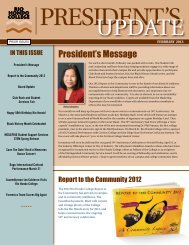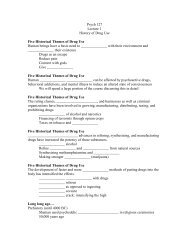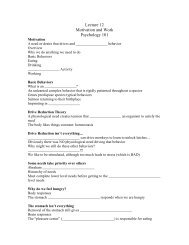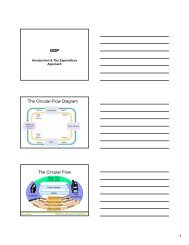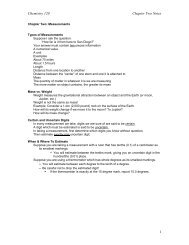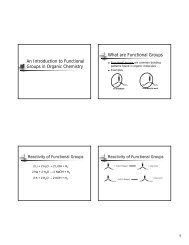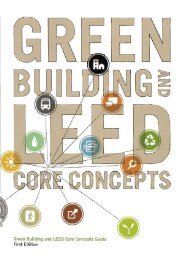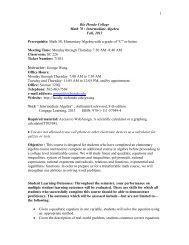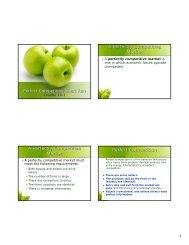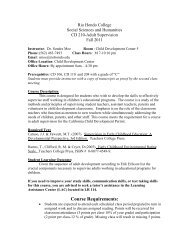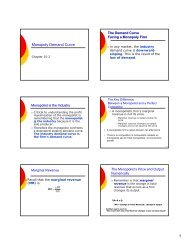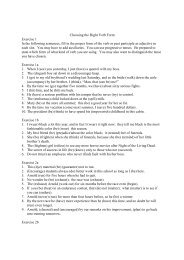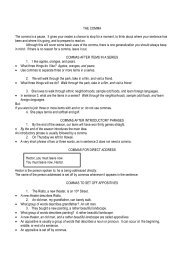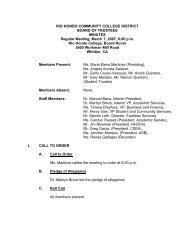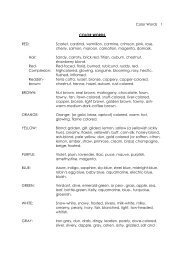Complete College Catalog 2011-2012 - Rio Hondo College
Complete College Catalog 2011-2012 - Rio Hondo College
Complete College Catalog 2011-2012 - Rio Hondo College
You also want an ePaper? Increase the reach of your titles
YUMPU automatically turns print PDFs into web optimized ePapers that Google loves.
interested in the carpentry industry.<br />
Modules cover the following topics:<br />
history of the carpentry profession<br />
along with state and federal labor law,<br />
job layout, safe working conditions,<br />
health and safety certifications, basic<br />
blueprint reading, advanced blueprint<br />
reading, use and application of levels<br />
and transits, foundations, flatwork, wall<br />
structures, stairs and ramps, welding<br />
materials and welding applications.<br />
1 Unit<br />
20 Lecture hours<br />
20 Lab hours<br />
CARP 020J<br />
Advanced Blueprint<br />
Prerequisite: Indentured Apprentice<br />
with the State of California.<br />
Advisory: ENGL 035 or ESL 198 or<br />
appropriate assessment; READ 023 or<br />
appropriate assessment; MATH 020 or<br />
appropriate assessment<br />
This course is designed to meet the<br />
needs of Indentured Apprentices<br />
with the State of California who are<br />
interested in the carpentry industry.<br />
Modules cover the following topics:<br />
history of the carpentry profession<br />
along with state and federal labor law,<br />
job layout, safe working conditions,<br />
health and safety certifications, basic<br />
blueprint reading, advanced blueprint<br />
reading, use and application of levels<br />
and transits, foundations, flatwork,<br />
wall structures, stairs and ramps,<br />
welding materials and welding<br />
applications.<br />
1 Unit<br />
20 Lecture hours<br />
20 Lab hours<br />
____________________<br />
CHEMISTRY<br />
Division of Mathematics & Sciences<br />
CHEM 101<br />
Chemistry and Our World<br />
Prerequisite: READ 023 or appropriate<br />
assessment<br />
Advisory: ENGL 101; MATH 030 or<br />
appropriate assessment<br />
Transfers to: UC (credit limit*), CSU<br />
(*The UC will grant credit for only one<br />
of the following courses: CHEM 101,<br />
CHEM 110.)<br />
This course explores the properties<br />
and reactions of matter, focusing<br />
on chemical applications of social<br />
concern. Student will investigate<br />
elementary principles of chemistry,<br />
including chemical and physical<br />
properties of the elements, the states<br />
of matter, nomenclature, basic atomic<br />
theory, acids and bases, organic<br />
chemistry, biochemistry, and nuclear<br />
chemistry. Supplementary topics will<br />
be selected from topics of current<br />
social interest, including air and water<br />
pollution: chemical, nuclear and<br />
alternative energy sources; chemical<br />
and biological warfare; chemistry<br />
and the law; and the pharmaceutical<br />
industry and drug design. Emphasis<br />
will be placed on the construction of<br />
effective and informed arguments,<br />
both verbal and written. The content<br />
of this course is oriented to the nonscience<br />
major, and mathematical<br />
content will be presented at a basic<br />
level.<br />
3 Units<br />
54 Lecture hours<br />
CHEM 101L<br />
Chemistry and Our World Laboratory<br />
Prerequisite/Corequisite: CHEM 101<br />
Transfers to: UC, CSU<br />
This laboratory course complements<br />
the corresponding lecture section,<br />
demonstrating important concepts and<br />
theories through relevant experiments.<br />
Topics will include simple chemical<br />
reactions, separations of mixtures, and<br />
formation and analysis of everyday<br />
chemicals, among others. The scientific<br />
method will be presented as a tool<br />
to guide laboratory investigations.<br />
Laboratory measurement techniques<br />
will be emphasized throughout the<br />
course.<br />
1 Unit<br />
54 Lab hours<br />
CHEM 110<br />
Chemistry for Allied Health Majors<br />
Prerequisite: Math 050 or appropriate<br />
assessment<br />
Advisory: ENGL 035 or ESL 198 or<br />
appropriate assessment; READ 023 or<br />
appropriate assessment; Concurrent<br />
enrollment in MATH 070<br />
Transfers to: UC (credit limit*), CSU<br />
(* The UC will grant credit for only one<br />
of the following courses: CHEM 110,<br />
CHEM 120.)<br />
This course provides an introduction<br />
to the fundamental concepts of<br />
general, organic, and biological<br />
chemistry, and is especially<br />
appropriate for students intending to<br />
pursue a career in nursing and other<br />
health-related professions, including<br />
kinesiology and psychology. Emphasis<br />
is placed on the relationship between<br />
chemistry and the health/medical<br />
sciences. Weekly laboratory activities<br />
require students to empirically verify<br />
concepts presented in lectures. No<br />
previous background in chemistry<br />
is required or expected of students<br />
enrolling in this course.<br />
5 Units<br />
54 Lecture hours<br />
54 Lab hours<br />
18 Hours<br />
CHEM 120<br />
Introduction to Chemistry<br />
Prerequisite: MATH 70 with a grade of<br />
“C” or better or appropriate assessment<br />
Advisory: ENGL 035 or ESL 198 or<br />
appropriate assessment; READ 023 or<br />
appropriate assessment<br />
Transfers to: UC (credit limit*), CSU<br />
(* The UC will grant credit for only one<br />
of the following courses: CHEM 110,<br />
CHEM 120.)<br />
This one-semester course is designed<br />
for students intending to major in<br />
science or engineering. The course<br />
primarily prepares students for<br />
Chemistry 130; additionally, it fulfills<br />
the general education requirement<br />
in the physical sciences. This course<br />
introduces the fundamental principles<br />
of general chemistry, with emphasis<br />
on chemical nomenclature and<br />
quantitative problems in chemistry.<br />
The lecture presents classical and<br />
modern chemistry including atomic<br />
theory, periodic properties, chemical<br />
bonding, chemical reactions,<br />
stoichiometry, acids and bases, gas<br />
laws and solutions. The laboratory<br />
introduces the techniques of<br />
experimental chemistry with examples<br />
from all areas of chemistry.<br />
5 Units<br />
54 Lecture hours<br />
54 Lab hours<br />
18 Hours<br />
CHEM 130<br />
General Chemistry<br />
Prerequisite: CHEM 120 with a grade of<br />
“C” or better<br />
Advisory: ENGL 101; READ 023 or<br />
appropriate assessment; MATH 175 or<br />
appropriate assessment<br />
Transfers to: UC, CSU<br />
Chemistry 130 is the first semester of<br />
a two semester sequence designed for<br />
students intending to major in science<br />
and engineering. The lecture course<br />
covers classical/modern chemistry,<br />
with applications, in stoichiometry and<br />
classical atomic theory of chemistry,<br />
periodic properties, gas laws, modern<br />
quantum theory of atomic and<br />
molecular structure and periodic<br />
properties, thermochemistry, liquids<br />
and solids, solution chemistry. The<br />
laboratory introduces experimental<br />
chemistry with examples from all<br />
areas of chemistry.<br />
5 Units<br />
54 Lecture hours<br />
72 Lab hours<br />
36 hours<br />
CHEM 131<br />
General Chemistry<br />
Prerequisite: CHEM 130 with a grade of<br />
“C” or better<br />
Advisory: ENGL 101; READ 023 or<br />
appropriate assessment; MATH 180 or<br />
appropriate assessment<br />
Transfers to: UC, CSU<br />
CHEM 131 is a continuation of<br />
CHEM 130. Theory and techniques<br />
of elementary physical chemistry<br />
are stressed. Emphasis is placed on<br />
the dynamics of chemical change<br />
using thermodynamics and reaction<br />
kinetics as the major tools. A thorough<br />
treatment of equilibrium is given, with<br />
many examples of solubility, acidbase,<br />
and redox equilibria, including<br />
electrochemical concepts. Brief<br />
introductions to organic and nuclear<br />
chemistry are presented. Various<br />
analytical techniques used in modern<br />
chemistry are introduced. Descriptive<br />
chemistry of representative metallic<br />
and nonmetallic elements is included.<br />
3 Units<br />
54 Lecture hours<br />
154 / <strong>Rio</strong> <strong>Hondo</strong> <strong>College</strong> <strong>2011</strong>-<strong>2012</strong> <strong>Catalog</strong>



